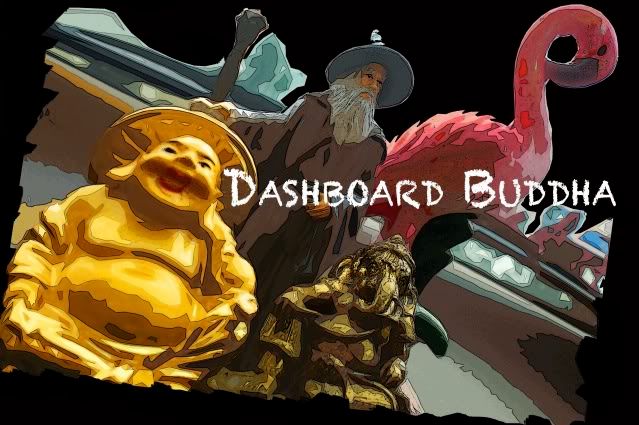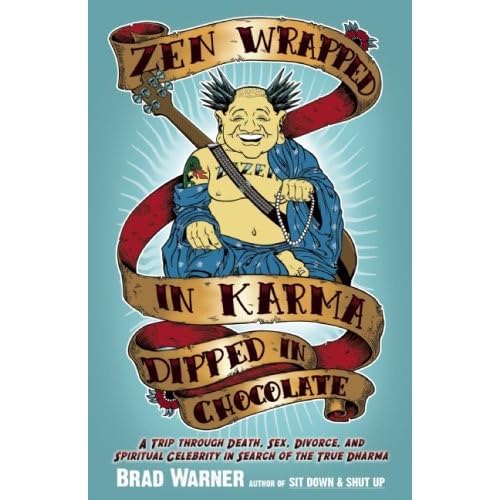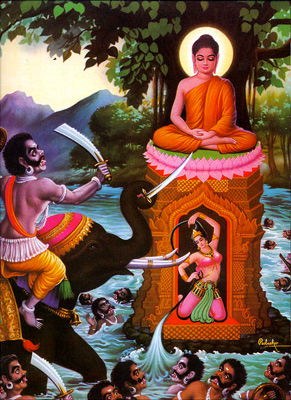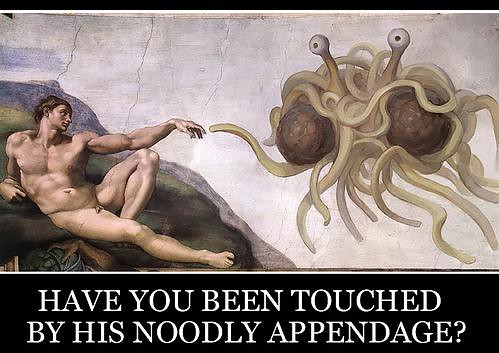
"Jesters do oft prove prophets.”
Fig.1 American Buddha?
I read somewhere that to take the Buddhist path requires developing a sense of humor. Humor helps you let go of pride, laughter erodes ego. Obviously, that went a long way with me. Laughter is my drug of choice. I laugh so heartily and consistently every morning and evening watching my favorite shows that my sister’s quaker parrot learned to perfectly imitate my chortles of joy. If I don’t get boisterous at least once a day, I feel stagnant. Heart half-full. If I can laugh all the way to enlightenment, then show me the way.
Jon Stewart has said in a few interviews that a person’s sense of humor only goes as far as their ideology. He explains that sometimes people come up to him and say they love his show and think he’s hysterical except for the time when he made a joke about global warming. Or abortion or foreign policy or last night’s episode of American Idol.
The Buddha says “Attachment causes suffering.” People get offended about things they have a personal affinity for, their attachment to it sucks out all the humor, and they suffer in the form of anger or resentment.
Why do Creationists want to discredit evolution so much? Why do scientists roll their eyes at the idea of intelligent design? Why do Man U fans verbally abuse Chelsea fans at football games? Why did I despise Tina Fey with relish when I heard she dissed Jon Stewart even though it was clearly taken out of context and she doesn’t actually harbor any ill will toward the man in any shape or form except perhaps a bit of envy that he’s so much more iconoclastic and clever and influential than she?

Fig.2 Rescue me from ignorance
Each party feels that the Other holds sacred certain ideas that encroach upon beliefs. Our beliefs, which we hold so dear, are very personal and we perceive them as an extension of ourselves. If someone attacks our beliefs, it’s an attack on our own existence.
As self-proclaimed “equal opportunity satirists,” Jon and his Daily Show crew have ripped into everything. Nothing is sacred except the almighty Laugh. He’s the classical court jester: the only person (simply by virtue of being the Fool) allowed to call out the King by poking comedic holes in his actions and policies. The Fool has very little ego and frequently depreciates himself with pratfalls, laughter, and general tomfoolery. He doesn’t care about his reputation.

Fig.3 Make fun of thyself
A speaker on the Path of the Ekayana podcast once concluded that Buddhism has a joke at its heart. One of the speaker’s teachers—one who always seemed to have a little smirk on his face—said that when you become enlightened (that is, once you don’t care about ego), you get all the jokes. Ultimately, that’s what Buddhism is: getting all the jokes. Everyone should aspire to be the Fool.
That said, everyone should care.
I wasn’t intending to sound cryptic. The best things in Buddhism come in Yoda koans.
The Fool, in fact, does care. He may even care more than anyone else. The trick is to hold that caring like an egg in the grip of the mind. He holds it gently and considers it in its entirety. He holds it long enough to find the flaws and cracks, then remembers that the egg is not an extension of himself. He is not the egg. He is not the anger or worry or disgust. The egg is there to spur the insight to learn or to take action... or make a joke.

Fig.4 All in a jester's day's work
The Buddha once told his monk buddies that they should use his teachings as a raft they leave behind as soon as it’s fulfilled its usefulness. You don’t haul a raft out of the river to cross a desert. The raft would be heavy and would just drag behind you and people would question your sanity. Similarly, if the Fool continues to carry the egg, it starts to rot and people tend to avoid him and his odoriferousness.
But the Fool is no fool. He extracts the joke, then promptly tosses the egg away. It smashes against the wall and everyone laughs. We laugh at impermanence because we inherently know that it’s silly to think anything lasts forever. We laugh at our false perception that an egg can survive being thrown at the wall. We laugh at our false perception that our problems will never end.
Laughter is a little piece of enlightenment, and if Jon Stewart teaches us nothing else, it's that fact.

Fig.5 Simpsonified
--Regan, King Lear Act V, Scene III

Fig.1 American Buddha?
I read somewhere that to take the Buddhist path requires developing a sense of humor. Humor helps you let go of pride, laughter erodes ego. Obviously, that went a long way with me. Laughter is my drug of choice. I laugh so heartily and consistently every morning and evening watching my favorite shows that my sister’s quaker parrot learned to perfectly imitate my chortles of joy. If I don’t get boisterous at least once a day, I feel stagnant. Heart half-full. If I can laugh all the way to enlightenment, then show me the way.
Jon Stewart has said in a few interviews that a person’s sense of humor only goes as far as their ideology. He explains that sometimes people come up to him and say they love his show and think he’s hysterical except for the time when he made a joke about global warming. Or abortion or foreign policy or last night’s episode of American Idol.
The Buddha says “Attachment causes suffering.” People get offended about things they have a personal affinity for, their attachment to it sucks out all the humor, and they suffer in the form of anger or resentment.
Why do Creationists want to discredit evolution so much? Why do scientists roll their eyes at the idea of intelligent design? Why do Man U fans verbally abuse Chelsea fans at football games? Why did I despise Tina Fey with relish when I heard she dissed Jon Stewart even though it was clearly taken out of context and she doesn’t actually harbor any ill will toward the man in any shape or form except perhaps a bit of envy that he’s so much more iconoclastic and clever and influential than she?

Fig.2 Rescue me from ignorance
Each party feels that the Other holds sacred certain ideas that encroach upon beliefs. Our beliefs, which we hold so dear, are very personal and we perceive them as an extension of ourselves. If someone attacks our beliefs, it’s an attack on our own existence.
As self-proclaimed “equal opportunity satirists,” Jon and his Daily Show crew have ripped into everything. Nothing is sacred except the almighty Laugh. He’s the classical court jester: the only person (simply by virtue of being the Fool) allowed to call out the King by poking comedic holes in his actions and policies. The Fool has very little ego and frequently depreciates himself with pratfalls, laughter, and general tomfoolery. He doesn’t care about his reputation.

Fig.3 Make fun of thyself
A speaker on the Path of the Ekayana podcast once concluded that Buddhism has a joke at its heart. One of the speaker’s teachers—one who always seemed to have a little smirk on his face—said that when you become enlightened (that is, once you don’t care about ego), you get all the jokes. Ultimately, that’s what Buddhism is: getting all the jokes. Everyone should aspire to be the Fool.
That said, everyone should care.
I wasn’t intending to sound cryptic. The best things in Buddhism come in Yoda koans.
The Fool, in fact, does care. He may even care more than anyone else. The trick is to hold that caring like an egg in the grip of the mind. He holds it gently and considers it in its entirety. He holds it long enough to find the flaws and cracks, then remembers that the egg is not an extension of himself. He is not the egg. He is not the anger or worry or disgust. The egg is there to spur the insight to learn or to take action... or make a joke.

Fig.4 All in a jester's day's work
The Buddha once told his monk buddies that they should use his teachings as a raft they leave behind as soon as it’s fulfilled its usefulness. You don’t haul a raft out of the river to cross a desert. The raft would be heavy and would just drag behind you and people would question your sanity. Similarly, if the Fool continues to carry the egg, it starts to rot and people tend to avoid him and his odoriferousness.
But the Fool is no fool. He extracts the joke, then promptly tosses the egg away. It smashes against the wall and everyone laughs. We laugh at impermanence because we inherently know that it’s silly to think anything lasts forever. We laugh at our false perception that an egg can survive being thrown at the wall. We laugh at our false perception that our problems will never end.
Laughter is a little piece of enlightenment, and if Jon Stewart teaches us nothing else, it's that fact.

Fig.5 Simpsonified











